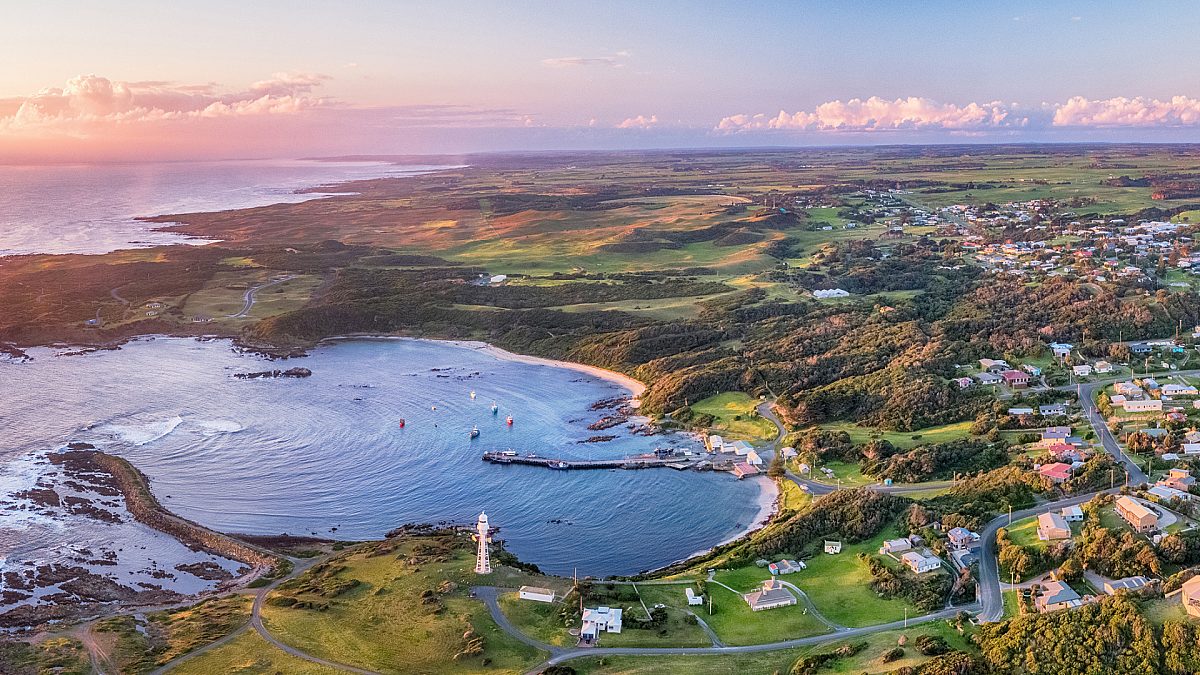
King islanders say no
Locals protest destructive oil and gas exploration
On 24 August 2021, 200 people attended a protest in King Island. In most places, that’s not news, but here it is: that crowd is one-eighth of the population of the Bass Strait island.
They’d gathered for the island’s biggest-ever rally: on boats and surfboards, standing on the jetty holding placards opposing fossil-fuel exploration in the pristine ocean around their home.
According to recently retired cray fisherman Tony ‘Bear’ Alexander, this water is a big part of the island’s attraction. “Everybody on King Island owns the water. Why would you want to damage it?”
Yet the Federal Government has recently approved two proposals for seismic surveys of the surrounding sea floor – a process with potential impacts on marine life, important fisheries and island residents – to allow companies to search for gas and oil deposits. US energy giant ConocoPhillips was the first, getting final approval on 11 August.
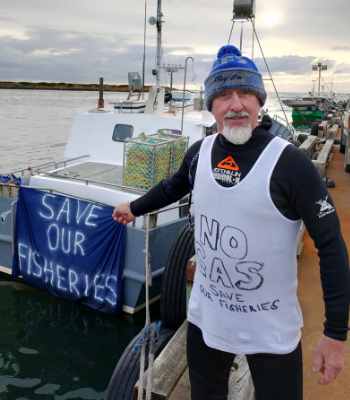
According to Bear, “The community were kept pretty much in the dark.” He’d heard about the proposal and was worried about the effect on marine life and his livelihood, about the thought of gas rigs looming on the horizon. He attended a Zoom meeting with the company to raise concerns but: “It was too late then - it was already over and done with. The government had sold us out.”
King Island mayor Julie Arnold was interviewed in the Guardian on 28 August 2021, saying that the inability to rule out any impact on fisheries was at the core of community concern.
“People had some optimism that all the work that was done and the explanations we’d given about why we felt this was not the right thing to do would have some cut through,” Arnold said. “They now realise it’s had no cut-through at all.
“Basically, the approvals have been given regardless of the feelings of the people and the businesses that are being affected by this.”
The community has said “no!”
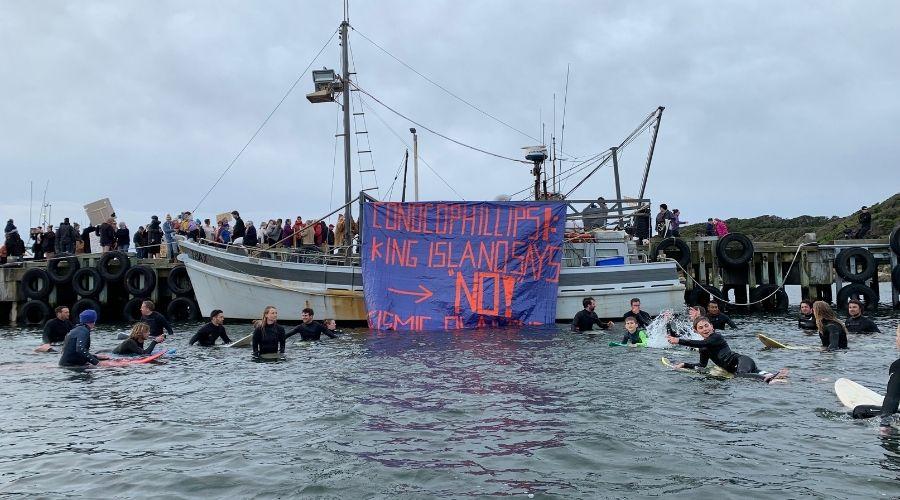
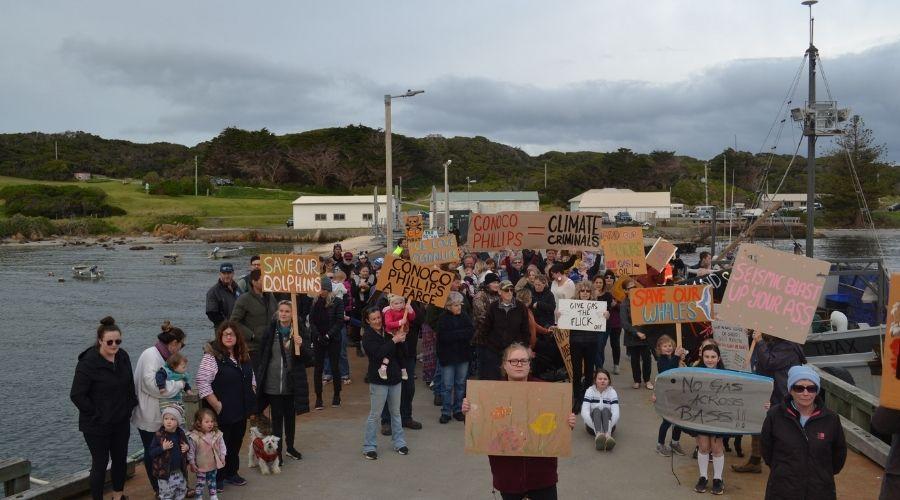
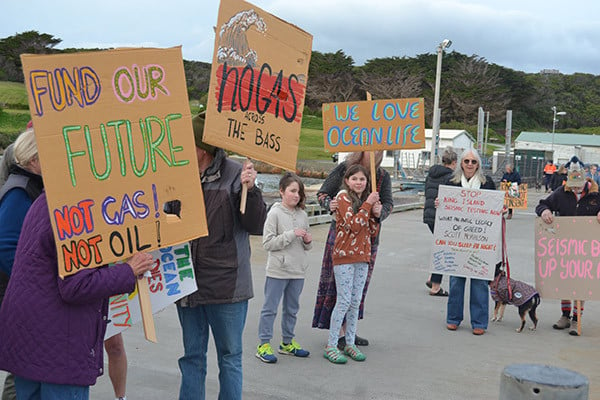
“The King Island community doesn’t want seismic blasting,” said Tom Allen. “ConocoPhillips carries no social licence to operate.” Image: Tom Allen
“People on the island are unhappy with the lack of communication about the impacts this seismic surveying will have on their lives and livelihoods.” said Surfrider's Ally King. Image: Tom Allen
The paddle out saw 200 local people, fishers, surfers on the water and pedestrians congregate at the harbour at the capital Currie with placards and banners. Image: Tom Allen
ConocoPhillips’ approval covered more than 4000 square kilometres of sea floor. The process involving sending sound waves into rock layers and analysing the results to find potential gas deposits. It involved about 80 days of repeated sonic booms, with loudness ranging from 140 db to 212 db – the noise on an aircraft carrier’s deck to that of a rocket launch.
According to Tom Allen, campaign manager at The Wilderness Society, there are clear, known consequences. “The deafening sound is almost certain to devastate the island’s prized $22m rock lobster fishery, as well as the wider marine environment.”
ConocoPhillips’ own environmental plan admitted to potential impacts on the sound-sensitive fauna that reside in or migrate through the survey area – whales, fish, seals, invertebrates and more. The company claims these impacts are temporary, while Tasmanian Government scientists suggest they are permanent.
Where are our rights?
According to Bear, many locals are “pissed off” about not being able to stop the gas exploration.
And rightly so agrees Tom Allen.
“It shouldn’t have to be up to locals to fight destructive proposals like this. The community of King Island should have rights that guarantee they get a genuine say in the decisions that impact nature—and impact them.”
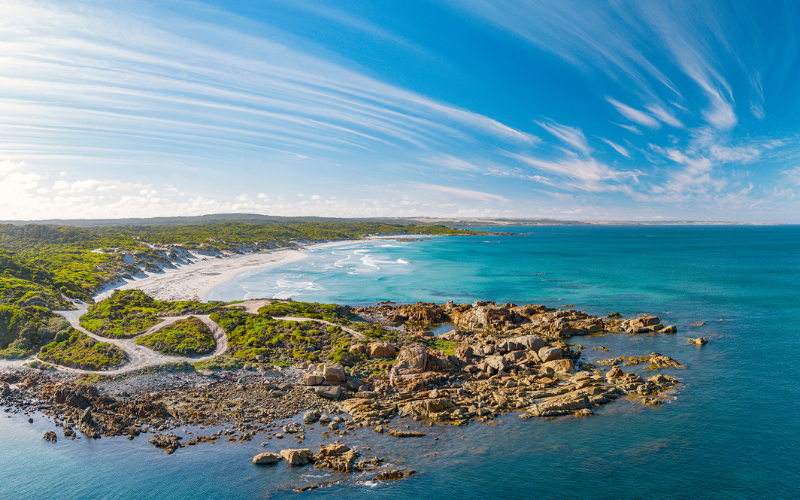
Communities shouldn’t have to try to change decisions that have already been made. Instead, communities should be given accurate, timely information that empowers them, allowing them to have a real say in public decisions.
Bear is angry about the process, saying, “This thing just came out of nowhere. We couldn’t stop it no matter what.” He takes the long view though, explaining that they were now more prepared, ready to face future threats. “If we can stop the next one, we’ve done our job.”